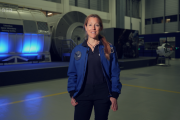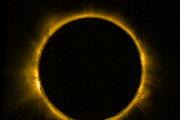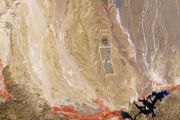
Copernical Team
BlackSky expands Gen 3 Assured deals with new defense customer
 BlackSky Technology Inc. has secured multiple Gen 3 Assured services contracts totaling seven figures with a new international defense customer following an early access period for the capability. The company reports that the expansion agreements signal a rapid shift by the customer toward advanced space-based dynamic monitoring as they scale to support time-sensitive tactical intelligence, surv
BlackSky Technology Inc. has secured multiple Gen 3 Assured services contracts totaling seven figures with a new international defense customer following an early access period for the capability. The company reports that the expansion agreements signal a rapid shift by the customer toward advanced space-based dynamic monitoring as they scale to support time-sensitive tactical intelligence, surv Why Modern Game Engines Struggle with Real Interstellar Combat Physics
 Your favorite space sim lies to you every single time you hit the throttle. Developers prioritize "fun" over "physics" because actual interstellar combat involves math that would melt your brain and your GPU simultaneously
Your favorite space sim lies to you every single time you hit the throttle. Developers prioritize "fun" over "physics" because actual interstellar combat involves math that would melt your brain and your GPU simultaneously Einstein effect clears planets from tight double star systems
 Of the more than 4,500 stars known to have planets, one puzzling statistic stands out. Even though nearly all stars are expected to have planets and most stars form in pairs, planets that orbit both stars in a pair are rare.
Of the more than 6,000 extrasolar planets, or exoplanets, confirmed to date - most of them found by NASA's Kepler Space Telescope and the Transiting Exoplanet Survey S
Of the more than 4,500 stars known to have planets, one puzzling statistic stands out. Even though nearly all stars are expected to have planets and most stars form in pairs, planets that orbit both stars in a pair are rare.
Of the more than 6,000 extrasolar planets, or exoplanets, confirmed to date - most of them found by NASA's Kepler Space Telescope and the Transiting Exoplanet Survey S Simulations and supercomputing calculate one million cislunar orbits
Verifying that you are not a bot
Antarctic ice feedback limits Southern Ocean carbon sink
 A sediment core from the Pacific sector of the Southern Ocean has provided a research team led by geochemist Dr Torben Struve from the University of Oldenburg, Germany, with evidence of an unexpected climate feedback in Antarctica. The study, published in Nature Geoscience, links changes in the West Antarctic Ice Sheet to variations in marine algae growth over several glacial cycles, but in a wa
A sediment core from the Pacific sector of the Southern Ocean has provided a research team led by geochemist Dr Torben Struve from the University of Oldenburg, Germany, with evidence of an unexpected climate feedback in Antarctica. The study, published in Nature Geoscience, links changes in the West Antarctic Ice Sheet to variations in marine algae growth over several glacial cycles, but in a wa Rock microbes reveal hidden groundwater carbon engine
 Deep underground, microbial communities living on rock surfaces are emerging as powerful but largely overlooked drivers of groundwater chemistry and carbon storage. A team from the Cluster of Excellence Balance of the Microverse at Friedrich Schiller University Jena has now shown that these attached microbes follow fundamentally different strategies from free-floating cells in groundwater, with
Deep underground, microbial communities living on rock surfaces are emerging as powerful but largely overlooked drivers of groundwater chemistry and carbon storage. A team from the Cluster of Excellence Balance of the Microverse at Friedrich Schiller University Jena has now shown that these attached microbes follow fundamentally different strategies from free-floating cells in groundwater, with NISAR radar view maps surface changes in Mississippi Delta
 A new radar image from the joint NASA-ISRO NISAR satellite shows how the mission can see through cloud cover to reveal surface features across the Mississippi River Delta region in southeastern Louisiana.
The scene, acquired on November 29, 2025, with NISAR's L-band synthetic aperture radar instrument, spans the cities of New Orleans and Baton Rouge, the winding Mississippi River between t
A new radar image from the joint NASA-ISRO NISAR satellite shows how the mission can see through cloud cover to reveal surface features across the Mississippi River Delta region in southeastern Louisiana.
The scene, acquired on November 29, 2025, with NISAR's L-band synthetic aperture radar instrument, spans the cities of New Orleans and Baton Rouge, the winding Mississippi River between t NASA Libera payload completes testing for future Earth energy tracking mission
 NASA's Libera Earth energy instrument has completed a full campaign of environmental testing and is now ready for delivery to its host satellite, marking a major milestone for the agency's long term record of Earth's radiation budget measurements. The test series included thermal vacuum trials that replicated the temperature extremes and vacuum conditions Libera will face in orbit, along with ot
NASA's Libera Earth energy instrument has completed a full campaign of environmental testing and is now ready for delivery to its host satellite, marking a major milestone for the agency's long term record of Earth's radiation budget measurements. The test series included thermal vacuum trials that replicated the temperature extremes and vacuum conditions Libera will face in orbit, along with ot DARPA taps Raytheon for new maritime defense system
 Raytheon, an RTX business, has been selected by the US Defense Advanced Research Projects Agency to develop an advanced sensing and targeting system to protect commercial shipping and naval logistics vessels from emerging maritime threats such as unmanned surface vehicles.
Under the Pulling Guard program, Raytheon s Advanced Technology team will design, build and demonstrate a system that
Raytheon, an RTX business, has been selected by the US Defense Advanced Research Projects Agency to develop an advanced sensing and targeting system to protect commercial shipping and naval logistics vessels from emerging maritime threats such as unmanned surface vehicles.
Under the Pulling Guard program, Raytheon s Advanced Technology team will design, build and demonstrate a system that 




















